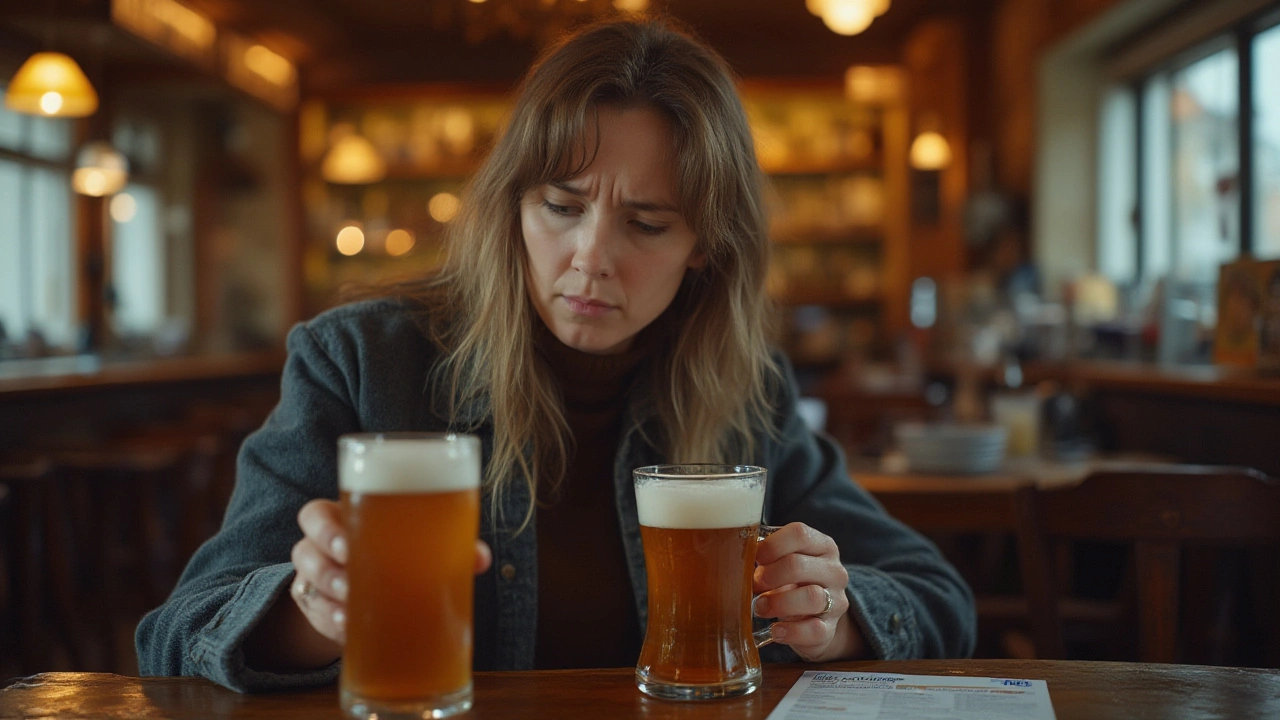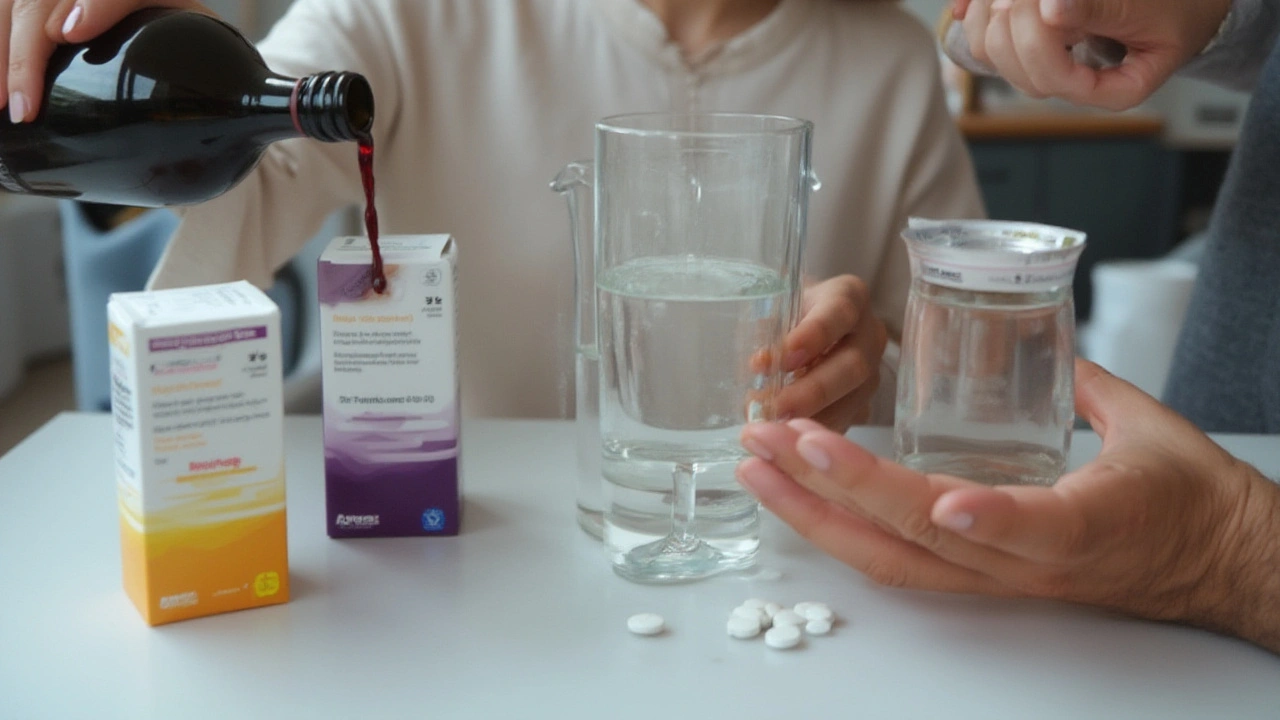Mixing Alcohol and Prescription Diuretics: Hidden Dangers Revealed

Imagine you’re celebrating with friends—it’s a warm evening, lots of laughs, and you’re sipping something strong. If you’re also taking a prescription diuretic like spironolactone, your body doesn’t care that you just want a good time. The mix can spell nasty surprises, and we’re not just talking about a hangover. The sad truth? Even folks who are clued up about their meds often underestimate how alcohol can amp up the side effects, flip the body’s electrolyte balance, and turn a safe dose into a risky gamble. It’s not about scare tactics—it’s about what really happens in your system, and what you can do to avoid it.
How Alcohol and Diuretics Interact in Your Body
Both alcohol and diuretics work overtime on your kidneys, but their partnership is like giving your bladder a double espresso. Diuretics—like spironolactone, furosemide, and hydrochlorothiazide—are known as “water pills” for a reason; they push extra salt and water out through your pee, easing blood pressure and swelling. Sounds simple, but there’s real chemistry at play. Spironolactone, for example, blocks aldosterone, keeping the kidneys from reabsorbing sodium but sparing potassium. Other diuretics just flush everything out. Now, toss alcohol into the mix. Alcohol is its own natural diuretic, nudging the pituitary gland to slow down antidiuretic hormone (ADH)—that’s the stuff telling your kidneys to save water. So, more alcohol means way more trips to the bathroom, serious fluid loss, and either super-dry skin, killer headaches, or both.
Even one or two drinks can tip a delicate balance. On average, a standard drink bumps up your urine output by up to 100ml. If you’re unlucky enough to be taking a hefty prescription of diuretics, that loss can grow quickly. For most people, mild dehydration is an annoyance. But if you’re dealing with heart failure, high blood pressure, or liver disease—that fluid loss can lower blood pressure so much that dizziness, falls, and confusion set in fast.
Spironolactone belongs to a group called potassium-sparing diuretics. When you mix it with alcohol, your blood may get thicker (thanks to fluid loss) but your potassium might shoot up or tank unexpectedly. If potassium goes sky-high, you could feel muscle cramps, pounding heartbeats, or in rare cases, sudden cardiac arrest. Pairing alcohol and spironolactone just isn’t a good move. Check out this alcohol and spironolactone resource for a deeper breakdown of the main dangers, including why people with certain health problems are warned off the combo.
The numbers tell the story. Emergency rooms in the U.S. report a 30% higher rate of severe dehydration in patients taking diuretics who admit to moderate alcohol use. One hospital audit looked at over 400 admissions for dizziness, confusion, or fainting in people taking diuretics, and in nearly 40% of these, recent alcohol use played a role. So the theory really matches up with real-life outcomes.
Electrolyte Chaos: Why Potassium Matters Most
When you lose water from your system, you’re not just peeing out fluids. You’re flushing out sodium, potassium, and magnesium—the building blocks that keep your nerves firing and your heart in rhythm. For people on diuretics, that means you’re already walking a tightrope with your potassium. Throw in alcohol, and you can fall off either side. Too little potassium? Expect muscle aches, tiredness, and in weird cases, even breathing problems. Too much? That’s where it gets scary: irregular heartbeats, numbness, and sometimes sudden collapse.
Here’s a quick snapshot of what can go wrong if you combine drinking with potassium-sparing diuretics like spironolactone:
- Muscle cramps, especially at night
- Unusual fatigue or confusion
- Heart palpitations or fluttering
- Nausea, vomiting, or a metallic taste in your mouth
- Extreme thirst but dark or low urine output
- High potassium (hyperkalemia) that can stop your heart
The data backs it up. A 2023 study from the Journal of Clinical Medicine tracked people on spironolactone: those who had more than three alcoholic drinks a week were three times more likely to land in hospital with abnormal potassium. Even the ‘fun-sized’ amount of alcohol—just one or two drinks—could double your risk compared to being sober.
| Serum Potassium (mmol/L) | Symptoms | Risk Level |
|---|---|---|
| 3.5–5.0 | Normal | Low |
| 5.1–5.5 | Mild cramps, weakness | Moderate |
| 5.6–6.0 | Palpitations, dizziness | High |
| 6.1+ | Arrhythmia, confusion | Critical |
It isn’t just spironolactone’s potassium effects. Loop diuretics (like furosemide or bumetanide), often used for heart or kidney patients, dump potassium fast. So, drinking with these can spiral you downward into low potassium (hypokalemia), which sometimes brings deadly arrhythmias. Either way, the alcohol makes every side effect more likely. If you want specifics, your pharmacist can check your prescriptions and offer a reality check before you toast again.

The Less-Obvious Dangers: Blood Pressure, Liver, and More
You might think a couple of drinks is harmless, but watch what happens when you put alcohol and diuretics together. First off, your blood pressure could crash after just a small serving. That’s because alcohol widens your blood vessels, while diuretics lower your overall fluid volume. The result? Your brain gets less blood, making you woozy or prone to fainting. Not the best way to impress anyone at a dinner party.
Liver health is another wildcard. If you’re taking diuretics for liver cirrhosis or swelling, your doctor likely warned against alcohol for a good reason. Alcohol irritates your liver, making it work harder and heal slower. Some studies in 2024 found that even light drinking in cirrhosis patients on diuretics could double their risk of needing emergency drainage of excess abdominal fluid. That’s a fast track to the ER.
Also, diuretics like thiazides and spironolactone can mess with your body’s ability to remove uric acid—the stuff that causes gout. Pair that with drinks like beer or sweet cocktails, which raise uric acid on their own, and you could wake up with swollen joints and killer pain.
Here’s another problem—mixing up meds. After one too many, people are likelier to miss their next diuretic dose or accidentally double up. That’s a recipe for dangerous ups and downs in blood pressure, swelling, and kidney function. Not worth the risk just for a buzz.
For folks already at higher risk—older adults, anyone with kidney or heart issues, those with a history of electrolyte imbalances—the stakes go through the roof. Even people who feel perfectly fine can get sideswiped by the combo. Why? Kidneys don’t warn you when they’re overwhelmed, and often the first sign of trouble is something like confusion or a trip to the ER. Play it safe: if you’re on a diuretic, ask your doc how much you can drink, if at all—and if you notice any weird symptoms, get checked out fast.
Smart Drinking Tips for Diuretic Users—and How to Stay Safe
If you’re determined to have the occasional drink while on spironolactone or another diuretic, there are ways to lower your risk—but it starts with honesty and tracking how you feel. Here are some realistic tips for mixing caution with social life:
- Hydrate constantly. Drink a glass of water before, during, and after your drink. It sounds simple, but it actually cuts dehydration risk in half.
- Stick to one “standard” drink per occasion: that’s a 5-ounce wine, 12-ounce beer, or 1.5-ounce shot. Anything more, and you’re pushing your kidneys and electrolytes toward trouble.
- Avoid sugary or “energy” alcoholic mixers—these hit your kidneys harder and raise uric acid too, boosting the risk of gout and dehydration.
- Never skip your prescription or adjust your diuretic dose on your own to make room for drinking. This swings your potassium and blood pressure out of control even faster.
- Watch for warning signs: extreme thirst, confusion, leg cramps, heart flutters, or chest pain. These are red flags to stop and call your doctor.
- Use a pill planner or phone app if drinking disrupts your medication routine—missed doses are a bigger problem than most people realize.
- If you’re over 60, or have a kidney/heart/liver history, skip alcohol entirely while on diuretics. Every extra risk factor pumps up the dangers as you age.
- Plan your social events with a non-alcoholic option in hand—you’ll never regret having a backup when everyone else is on round three.
Staying informed is half the battle. Knowing the realities of alcohol and spironolactone and their interactions doesn’t have to spell doom for your summer plans, but ignoring them could. It’s less about being a buzzkill and more about keeping your body—and your weekends—running smoothly. The best advice? Communicate with your healthcare team, listen to your body, and treat your prescription like the serious piece of chemistry it is. That way, you can celebrate long after the last glass is gone.


Becky Jarboe
It’s fascinating how the article outlines the cascade of renal events when alcohol meets a potassium‑sparing diuretic; the interplay between ADH suppression and aldosterone blockade creates a perfect storm for electrolyte volatility. The author rightly points out that even modest intake can tilt the balance, especially in patients with compromised cardiac output. By emphasizing the quantitative increase in urine output per standard drink, the piece gives clinicians a concrete metric to discuss with patients. The mention of hyper‑kalemia risk is spot‑on, and the reference to real‑world ER statistics grounds the argument in evidence‑based practice. Overall, the write‑up stays on target without veering into alarmist territory.
Carl Boel
What a disgraceful cavalier attitude some people have toward mixing meds with booze; it’s downright irresponsible to think a couple of cocktails are harmless when you’re on a prescription that already tinkers with your fluid balance. The article lays out the science, but the moral of the story is simple: respect your body and the law of cause‑and‑effect. Ignoring these warnings isn’t just personal folly-it’s a societal danger that fuels unnecessary emergency room visits and burdens our healthcare system.
Shuvam Roy
From a clinical perspective, the content accurately captures the mechanisms by which ethanol augments diuretic‑induced natriuresis. The suppression of antidiuretic hormone synergizes with the aldosterone‑antagonist activity of spironolactone, leading to a net loss of extracellular volume and potential hypovolemia. It is prudent to monitor serum electrolytes, particularly potassium, in patients who report alcohol consumption while on these agents. Additionally, patient education should stress the importance of maintaining adequate hydration and recognizing early signs of hypotension, such as dizziness or syncope.
Jane Grimm
While the exposition is undeniably thorough, the prose suffers from an overabundance of superfluous adjectives and unnecessary jargon, which may obfuscate the core message for lay readers. Moreover, certain grammatical constructions-such as the inconsistent use of the serial comma-detract from the otherwise solid factual foundation. Nevertheless, the article succeeds in highlighting the clinical ramifications of this drug‑alcohol interaction, a topic often neglected in routine counseling.
Nora Russell
A meta‑analytical lens reveals that the correlation between moderate ethanol ingestion and exacerbated diuretic side‑effects is not merely anecdotal but statistically substantiated across multiple cohort studies. The heterogeneity of patient populations-ranging from hypertensive cohorts to those with congestive heart failure-underscores the universal applicability of the cautionary recommendations. In essence, the data compel a paradigm shift toward proactive electrolyte surveillance in any patient prescribed a water‑pill who also admits to alcohol use.
Craig Stephenson
Bottom line: if you’re on a diuretic, keep your drinks low and stay hydrated. A glass of water before and after each alcoholic beverage can cut the dehydration risk dramatically. Also, set a reminder on your phone to take your med at the same time every day-missing a dose can swing your potassium levels the wrong way. Talk to your pharmacist; they can help you track any changes.
Tyler Dean
They’re hiding the truth about the pharma push.
Susan Rose
Hey folks, just a friendly heads‑up: mixing your prescription water‑pills with even a couple of drinks can turn a fun night into a medical emergency. Stay smart, sip water, and keep an eye on how you feel.
diego suarez
We must consider the ethical dimension of personal autonomy versus communal health responsibility. While individuals have the right to make lifestyle choices, the ripple effect of preventable ER visits impacts society at large. Balancing self‑determination with informed consent means clinicians should provide clear, jargon‑free guidance about the risks of alcohol while on diuretics. Empowered patients are more likely to adhere to safer drinking practices, reducing the overall burden on healthcare resources.
Eve Perron
First and foremost, let us acknowledge that the intersection of ethanol metabolism and renal pharmacodynamics is a terrain fraught with nuanced variables; the hepatic oxidation of alcohol yields acetaldehyde, a compound that not only induces vasodilation but also modulates sympathetic tone, thereby compounding the diuretic‑induced reduction in arterial pressure. Moreover, the suppression of antidiuretic hormone (ADH) by ethanol creates a synergistic diuretic effect that is magnified in the presence of agents such as spironolactone, which already curtails sodium reabsorption while sparing potassium. The resultant hyper‑osmolar state precipitates an accelerated excretion of not just water but also vital electrolytes, a cascade that can culminate in either hyperkalemia or hypokalemia depending on the specific class of diuretic employed. Clinical observations have repeatedly demonstrated that patients who consume as little as one or two standard drinks per evening while on a potassium‑sparing regimen exhibit statistically significant shifts in serum potassium levels within a 24‑hour window. This phenomenon is not merely a laboratory curiosity; it translates into palpable symptoms-muscle cramps, palpitations, and in extreme cases, life‑threatening arrhythmias-that demand immediate medical attention. One must also consider the role of comorbid conditions: individuals with congestive heart failure or hepatic cirrhosis already endure altered fluid compartments, rendering them exquisitely sensitive to any additional diuretic burden. The literature, including a 2023 prospective cohort, quantifies a threefold increase in hospitalization for electrolyte derangements among those who exceed three alcoholic drinks per week while on spironolactone. Therefore, an interdisciplinary approach-encompassing physicians, pharmacists, and patient educators-is indispensable for mitigating risk. Practical recommendations, such as instituting a “water‑first” policy (a glass of water before, during, and after each alcoholic beverage) and employing a medication adherence app, have demonstrated efficacy in real‑world settings. Furthermore, routine laboratory monitoring, ideally every two weeks during the initiation phase of combined therapy, equips clinicians with the data needed to preempt adverse outcomes. In sum, the confluence of alcohol and diuretic therapy constitutes a high‑stakes balancing act; a disciplined, evidence‑based strategy is the only viable path to safeguarding patient health while preserving the occasional social indulgence. Patients should be counseled that the subjective feeling of “just a little buzz” does not equate to safety, especially when diuretic dosing is titrated to achieve optimal fluid status. Education materials that incorporate visual charts of electrolyte trends have been shown to improve patient recall. Lastly, healthcare systems ought to flag pharmacy dispensing records for concurrent alcohol‑related counseling prompts when diuretic prescriptions are filled. By integrating these multilayered safeguards, the medical community can transform a potentially lethal interaction into a manageable scenario.
Josephine Bonaparte
First off, ths artcile does a solid job at laying out the risk, but it could use a lil more punch when it comes to tellin folks to actually stop the booze if they’re on water‑pills. The science is there, the stats are there, so the only thing missing is a harder warning.
Meghan Cardwell
From a pharmacokinetic standpoint, ethanol acts as a competitive inhibitor of renal tubular reabsorption pathways, thereby amplifying the natriuretic effect of loop diuretics such as furosemide. This synergistic interaction not only accelerates volume depletion but also precipitates a precipitous drop in serum potassium, especially when the patient lacks adequate dietary intake. Clinicians should therefore consider dose adjustments or temporal separation of alcohol consumption and diuretic administration to mitigate iatrogenic electrolyte disturbances.
stephen henson
Super helpful tip: keep a water bottle handy during any social event 🍹➡️💧. If you’re on a diuretic, sip water between each alcoholic drink; it’s a simple habit that can halve the dehydration risk. Also, set a phone alarm for your medication time so you don’t miss a dose – consistency is key! 👍
Manno Colburn
Honestly, i think we need to look deeper into why the med‑industry kinda pushes diuretics without flagging the alcohol factor; it’s like they’re playing a game of chess while we’re stuck with checkers. The whole proccess of renal excretion gets messed up, and people dont even realize that a simple beer can tip the scales from safe to dangerous. Its a bit like walking a tightrope over a canyon with a flimsy rope – one slip and you’re in trouble, and no one wants that. So, ask your doc, read the fine print, and dont just assume everything is cool because the label says “use as directed”.
Namrata Thakur
Remember, your health is the main character in this story, and you have the power to write a happy ending; stay vigilant, monitor how you feel, and never ignore the subtle cues your body gives you when mixing alcohol with diuretics.
Chloe Ingham
They don’t want you to know that the pharma giants have a hidden agenda to keep you drinking while on their water‑pills, because the more you suffer, the more you’ll be dependent on their next‑generation drugs. Wake up, folks, the truth is being buried under a haze of cheap booze and glossy brochures.
Mildred Farfán
Oh sure, just throw a few shots into the mix and expect your kidneys to applaud you – because that’s how the universe works, right? Reality check: moderation isn’t a myth, it’s science.
Danielle Flemming
Yo, let’s keep it real – if you’re on a diuretic, the best party trick is to bring your own sparkling water and keep the buzz mild. No need to turn a night out into a medical drama.
Anna Österlund
Stop ignoring the science!